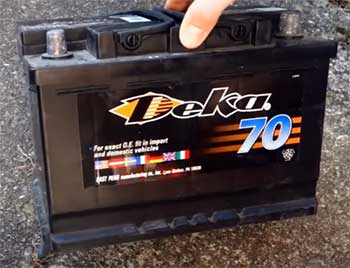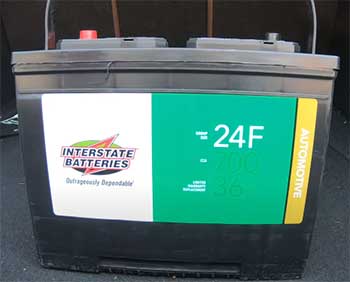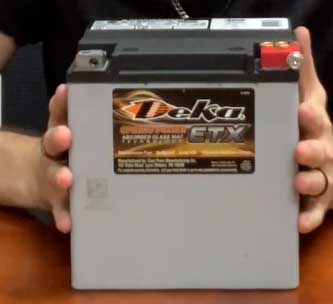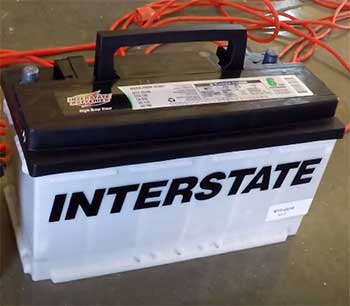I’ve spent years tinkering with vehicles, from my trusty pickup to my weekend RV, and one thing I’ve learned is that a good battery can make or break your experience. Choosing between Deka and Interstate batteries is a common dilemma for folks like us who want reliability, performance, and value.
In this article, I’ll break down the pros and cons of each brand, compare their key features, and share my analytical perspective to help you decide which battery suits your needs.
Whether you’re powering a car, boat, or off-grid system, I’ve got you covered with insights to make an informed choice.
A Brief Comparison Table
| Feature | Deka Batteries | Interstate Batteries |
| Manufacturer | East Penn Manufacturing Co., Inc. | Various (Johnson Controls, Exide, others) |
| Lifespan | 3–7 years (with proper maintenance) | 3–5 years (with proper maintenance) |
| Price Range | $80–$200 (more affordable) | $100–$250 (premium pricing) |
| Warranty | 6 months to 3 years (model-dependent) | Up to 48 months (longer for some models) |
| Battery Types | AGM, EFB, Flooded, Deep Cycle, Marine | AGM, Flooded, Deep Cycle, Marine, Powersport |
| Cold Cranking Amps (CCA) | 400–1000+ (high performance) | 500–1000 (reliable for most vehicles) |
| Maintenance | Mostly maintenance-free | Mostly maintenance-free |
| Best For | Marine, RVs, off-grid systems, budget-conscious buyers | Everyday vehicles, Powersport, backup systems, warranty-focused buyers |
| Availability | Authorized dealers, RV/marine stores | Widely available at auto parts stores, online |
| Vibration Resistance | Excellent (robust casing) | Good (varies by model) |
| Recharge Time | Faster (low internal resistance) | Slightly slower |
Deka Batteries: Key Features and Performance

Deka batteries have been a staple in my garage for years, and I’ve always appreciated their consistency.
East Penn Manufacturing, based in Pennsylvania, has been crafting these batteries for over 70 years, and their vertical integration—building everything from plates to casings in-house—gives them a quality edge.
I’ve used their Absorbed Glass Mat (AGM) batteries in my boat, and they’ve never let me down, even in choppy waters where vibration is a constant threat.
One thing I love about Deka is their focus on durability. Their batteries often feature robust casings that shrug off harsh conditions, whether it’s the salty air of a marine environment or the scorching heat under a car’s hood.
Their Enhanced Flooded Battery (EFB) and AGM lines are particularly impressive, offering low internal resistance for faster recharging. I’ve noticed my Deka batteries recover quickly after deep discharges, which is a lifesaver for off-grid setups.
Deka’s range is versatile, covering automotive, marine, industrial, and renewable energy applications. Their Intimidator line, for instance, uses AGM technology to deliver spill-proof performance and extended cycle life, making it a go-to for RVs and heavy-duty equipment.
I’ve also found their cold cranking amps (CCA) ratings—often ranging from 400 to over 1000—more than sufficient for starting my truck in freezing winters.
Pros of Deka Batteries
- Affordability: Deka batteries typically cost less than Interstate, with prices ranging from $80 to $200 depending on the model. This makes them a great pick if you’re watching your budget.
- Durability: The vibration-resistant casings and high-quality construction make Deka batteries ideal for rugged environments like marine or off-road use.
- Fast Recharge: Thanks to low internal resistance, Deka batteries charge quicker, which I’ve found handy when time is tight.
- Versatility: From ATVs to solar systems, Deka offers a wide range of battery types, including AGM, EFB, and deep-cycle options.
- Made in the USA: East Penn’s U.S.-based manufacturing ensures consistent quality, and I’ve always felt good supporting local production.
- Eco-Friendly: Deka emphasizes sustainable practices, with recyclable batteries and environmentally conscious manufacturing processes.
Cons of Deka Batteries
- Limited Availability: Unlike Interstate, Deka batteries aren’t as easy to find. You’ll need to hunt down authorized dealers or specialty RV/marine stores, which can be a hassle.
- Shorter Warranties: Deka’s warranties typically range from 6 months to 3 years, which is shorter than Interstate’s offerings for some models.
- Specialized Installation: Some Deka models, especially for industrial or marine use, may require specific equipment or expertise for installation, which isn’t always convenient.
- Brand Recognition: While Deka is respected in niche circles, it doesn’t have the mainstream clout of Interstate, which can make it harder to trust for first-time buyers.
Interstate Batteries: Key Features and Performance

Interstate has been my go-to for everyday vehicles, like my sedan, where reliability and ease of access matter most.
Unlike Deka’s single-source manufacturing, Interstate batteries are produced by multiple manufacturers, including Johnson Controls and Exide, depending on the product line.
This can lead to slight variations in quality, but I’ve generally found their batteries dependable for standard automotive needs.
Interstate’s strength lies in its accessibility. You can find their batteries at auto parts stores, repair shops, and even online retailers with ease. I’ve picked up Interstate batteries at Costco and had them installed at a local shop without any fuss.
Their lineup includes AGM, flooded, and deep-cycle batteries, with CCA ratings from 500 to 1000, making them solid for most cars, trucks, and Powersport vehicles.
One standout feature is Interstate’s warranty support. Many of their batteries come with a 48-month warranty, which gives me peace of mind knowing I’m covered for nearly four years.
Their deep-cycle batteries are also a favorite for backup systems and wheelchairs, offering consistent power delivery. However, I’ve noticed that Interstate batteries can take a bit longer to recharge compared to Deka, which can be a minor inconvenience during heavy use.
Pros of Interstate Batteries
- Wide Availability: Interstate batteries are everywhere—auto parts stores, Costco, online—you name it. This makes replacements a breeze.
- Longer Warranties: With up to 48 months of coverage, Interstate offers some of the best warranty terms in the industry.
- Reliability for Everyday Use: I’ve found Interstate batteries to be rock-solid for daily driving, with strong cold-start performance.
- Versatile Applications: From cars to scooters to solar backups, Interstate’s range covers a broad spectrum of needs.
- Trusted Brand: With decades of market presence, Interstate’s reputation gives you confidence in their products.
Cons of Interstate Batteries
- Higher Cost: Interstate batteries often carry a premium price tag, ranging from $100 to $250, which can sting if you’re on a tight budget.
- Variable Quality: Since they’re made by multiple manufacturers, quality can vary slightly depending on the batch or retailer.
- Slower Recharge: Compared to Deka, Interstate batteries tend to take longer to recharge, which can be a drawback for heavy-use scenarios.
- Maintenance Needs: While most models are maintenance-free, some Interstate batteries require occasional charging during storage to prevent self-discharge.
Key Differences Between Deka And Interstate Batteries
To make your decision easier, I’ve pinpointed the key factors that set Deka and Interstate apart. These differences highlight where each brand shines and where they might fall short, depending on your needs.
- Manufacturing Consistency

Deka batteries are made exclusively by East Penn Manufacturing, ensuring uniform quality across their range.
I’ve found their in-house production leads to reliable performance, especially for specialized Juno tasks like building plates and casings.
Interstate, however, uses multiple manufacturers like Johnson Controls and Exide, which can result in slight variations in quality.
This makes Deka a safer bet for consistent construction, while Interstate’s quality depends on the specific supplier.
- Availability and Accessibility
Interstate batteries are a breeze to find, available at major retailers like Costco, auto parts stores, and online. Deka, on the other hand, is harder to track down, often limited to specialty RV, marine, or industrial dealers.
For me, Interstate’s widespread presence is a huge plus when I need a quick replacement, but Deka’s niche distribution ensures you’re getting a specialized product.
- Warranty Periods
Interstate offers some of the longest warranties in the game, up to 48 months on many models, which gives me confidence for long-term use.
Deka’s warranties, ranging from 6 months to 3 years, are shorter, which might concern you if you prioritize coverage. I’ve found Interstate’s extended warranties particularly appealing for everyday vehicles where reliability is key.
- Price Point
Deka batteries are generally more affordable, with prices between $80 and $200, making them a great choice if you’re budget-conscious. Interstate’s premium pricing, often $100 to $250, reflects their brand recognition and warranty benefits.
In my experience, Deka’s lower cost doesn’t compromise quality, but Interstate’s higher price can feel justified for the convenience.
- Recharge Speed
Deka’s low internal resistance means faster recharge times, which I’ve noticed in my RV setups when time is short. Interstate batteries, while reliable, tend to recharge more slowly, which can be a drawback for deep-cycle or frequent-use scenarios.
If you’re constantly cycling your battery, Deka’s speed is a clear advantage.
- Application Specialization
Deka excels in specialized applications like marine, RV, and renewable energy systems, with robust AGM and EFB options designed for harsh conditions. Interstate focuses more on mainstream automotive and Powersport needs, with a broader but less specialized range.
My boat’s Deka battery has outlasted expectations, while Interstate’s been my go-to for simple car starts.
Real-World Applications of Deka And Interstate Batteries

Let me share a quick story. Last summer, I took my RV on a cross-country trip, relying on a Deka deep-cycle battery to power my lights and appliances.
The battery held up beautifully, even after days of heavy use without a recharge.
Meanwhile, my buddy, who swears by Interstate, had no issues with his car battery during the same trip, and when it needed a swap, he found a replacement at a nearby auto shop without breaking a sweat.
Both brands delivered, but the context mattered—Deka for my off-grid needs, Interstate for his on-road reliability.
For marine applications, Deka’s marine batteries are a standout.
Their vibration resistance and deep-cycle performance make them ideal for boats, where rough waters and constant power demands are the norm. Interstate’s marine batteries are no slouch either, but I’ve found their deep-cycle performance slightly less robust in extreme conditions.
For everyday vehicles, Interstate often takes the lead due to its accessibility and warranty. If you’re driving a sedan or truck and need a battery you can grab quickly, Interstate is hard to beat. But if you’re powering specialized equipment like ATVs or solar systems, Deka’s versatility and durability make it a strong contender.
Frequently Asked Questions (FAQ)
Deka batteries are made by East Penn Manufacturing Co., Inc., a U.S.-based company with over 70 years of experience.
With proper maintenance, Deka batteries typically last 3–7 years, with some models reaching up to 8 years.
Interstate batteries are manufactured by various companies, including Johnson Controls and Exide, depending on the product line.
Brands like Deka, Optima, Exide, and DieHard offer similar performance and reliability to Interstate batteries.
Conclusion: Making Your Choice
You’re probably wondering which battery I’d pick if I had to choose today. Honestly, it depends on what you need. If you’re after durability, affordability, and performance in rugged conditions, Deka’s got my vote—I’ve seen their batteries shine in marine and off-grid setups.
But if you want convenience, a killer warranty, and a brand you can find anywhere, Interstate’s your best bet. Weigh your priorities—budget, application, and accessibility—and you’ll know which one’s right for you. I hope my insights help you power up with confidence!

